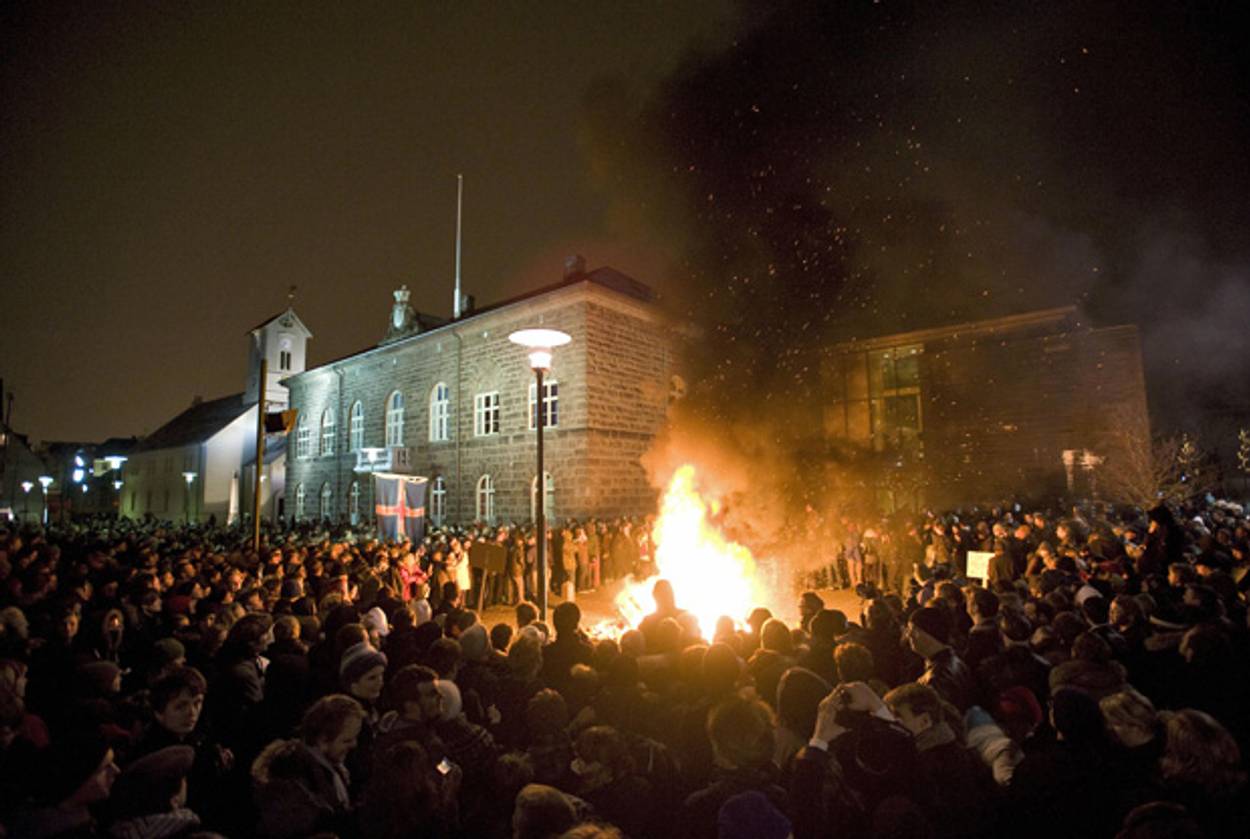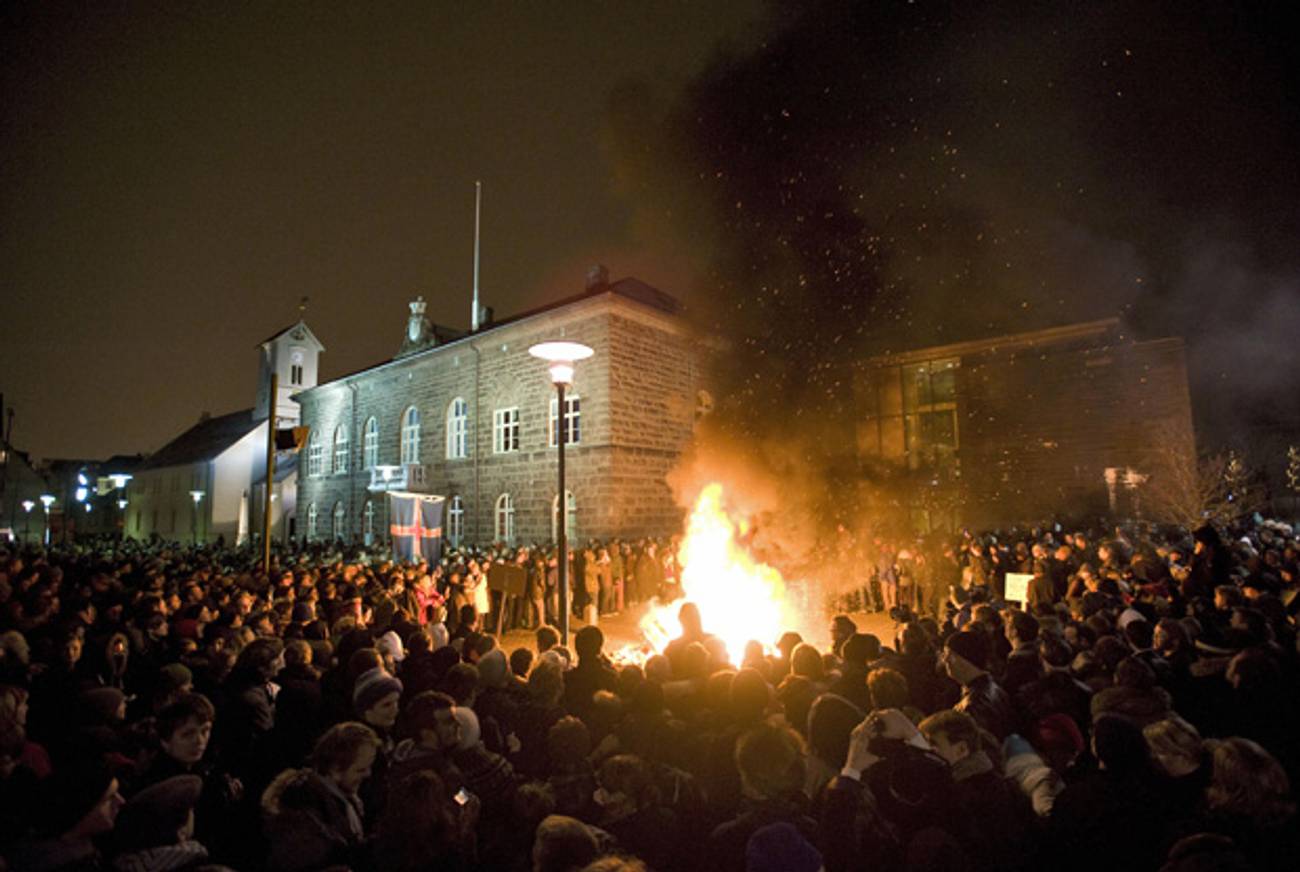Ice and Fire
Moses, the father of a radically egalitarian legal system, would have dug the soft financial revolution taking place in Iceland




Once upon a time, there was a faraway island; because it was very cold and had many glaciers, we’ll call it Iceland. The citizens of Iceland—because accuracy is very important, especially in fairy tales, let’s say there were approximately 318, 452 of them as of January of 2011—lived long, productive lives. Many of them fished for a living, and all enjoyed their little island’s geothermal power and uncanny talent for producing clever and artistic pop acts like Björk and Sigur Rós.
It was a happy place, until some evil financial wizards cast their spell. Neo Liberalus Economicus! they chanted, and suddenly Iceland’s banks were privatized, offering lenient conditions to foreign investors and attracting some serious capital. It seemed like the best of times on the icy little island: Construction boomed, the standard of living shot up, the future looked bright. But with foreign investment came foreign debt, and when the entire world experienced a financial meltdown—for reasons understood only by Odin and Asgard’s finest monetary minds—Iceland found itself hurting more than most. In 2007, for example, its national debt equaled 43 percent of its GDP; by 2009, that number shot up to 104 percent, while the banks’ debt equaled nine times the GDP and the currency, the kronor, lost something like 50 percent of its value.
Panicky, the island’s prime minister rushed to resolve the crisis, but he met with an imperial international community that sought to assume control of the debt and ensure that Iceland paid back all its foreign investors. This made the people of Iceland mad. They took to the streets. They brought down the government. But the new government wasn’t much better: It negotiated a massive settlement, which, as Deena Stryker put it in the Daily Kos, “required each Icelandic citizen to pay 100 Euros a month (or about $130) for fifteen years, at 5.5 percent interest, to pay off a debt incurred by private parties vis a vis other private parties. It was the straw that broke the reindeer’s back.”
The international community threatened severe sanctions, but the brave people of Iceland stood firm. Last year, they rejected the repayment of the debt. Also—and this part should really read like a fairy tale to us Americans—they began vigorous criminal investigations of those whose greed and carelessness led to such a colossal collapse. They also realized that the constitution they had, a little-changed version of the Danish Constitution (Denmark was Iceland’s sovereign until 1918), made the nation too dependent on foreign financial bodies and decided to rewrite it.
To that end, 25 qualified citizens were appointed to oversee the proceedings. A Facebook page was set up, and Icelanders were invited to contribute their suggestions to what would become the nation’s new foundational document. As Anna Andersen of The Reykjavik Grapevine, a prominent English-language magazine in Iceland, pointed out, this process was far from an Internet-enhanced version of ancient Athens, but it gave Icelanders a greater and giddier sense of participatory democracy than anything their peers in the West are likely to have ever felt.
This new constitution has yet to be approved. Contrary to some enthusiastic voices on the left who were quick to classify Iceland’s unusual response as a fairytale, the reality is far grayer and grimmer, as realities usually are. And while the exact scope of Iceland’s economic recovery, still very much a work in progress, remains to be seen, the island’s people have given the rest of us who rail against incompetent governments and wail under the burden of mounting debt an invaluable lesson: If you want to know what a responsible and engaged citizenry can do when financial trickery robs them of their future, just look at Iceland.
Although few of them are likely to cite Moses as inspiration, Iceland’s quiet, civil revolutionaries are operating very much in his spirit. In this week’s parasha, Moses introduces some of the philosophical principles of what would become the Israelites’ legal system. “You shall set up judges and law enforcement officials for yourself in all your cities that the Lord, your God, is giving you, for your tribes,” he commands, “and they shall judge the people with righteous judgment. You shall not pervert justice; you shall not show favoritism, and you shall not take a bribe, for bribery blinds the eyes of the wise and perverts just words.” And then, the famous words: “Justice, justice shall you pursue, that you may live and possess the land the Lord, your God, is giving you.”
To modern ears, Moses’ exhortations may sound quaint. But they’re radical: Whereas law was previously authored by the king and subject to his whim, it was now emanating from God himself, which meant that the nation entire was bound by it, all equal, none more mighty than the other. It also meant that justice ceased to be a relative concept and became an absolute—an offense against the laws isn’t just a misdemeanor but a sin. Finally, it erected a class of judges, ordinary men and women who would wisely and impartially address the nation’s quarrels.
It doesn’t take much of an imagination to see how close Iceland is coming these days to the Mosaic ideal. Icelanders elected judges from among the people to rewrite a constitution according to mutual agreement, and they rejected the usurious demands of the International Monetary Fund and other global bodies on a principle not economic but moral: More privatization, more power to the wealthy, more blind faith that only big business has the power to generate revenue is not only factually wrong but just plain evil.
Writing in the New York Times this week, Cornel West, lamenting the Disneyfication of Martin Luther King Jr.’s legacy, sounded a similar note. He didn’t mention Iceland by name but argued that King would have endorsed a Reykjavikian revolution, “a revolution in our priorities, a re-evaluation of our values, a reinvigoration of our public life and a fundamental transformation of our way of thinking and living that promotes a transfer of power from oligarchs and plutocrats to everyday people and ordinary citizens.”
Amen to that. To paraphrase another big believer in fairytales come true, if we will it, it is no dream.
Liel Leibovitz is a senior writer for Tablet Magazine and a host of the Unorthodox podcast.
Liel Leibovitz is editor-at-large for Tablet Magazine and a host of its weekly culture podcast Unorthodox and daily Talmud podcast Take One. He is the editor of Zionism: The Tablet Guide.